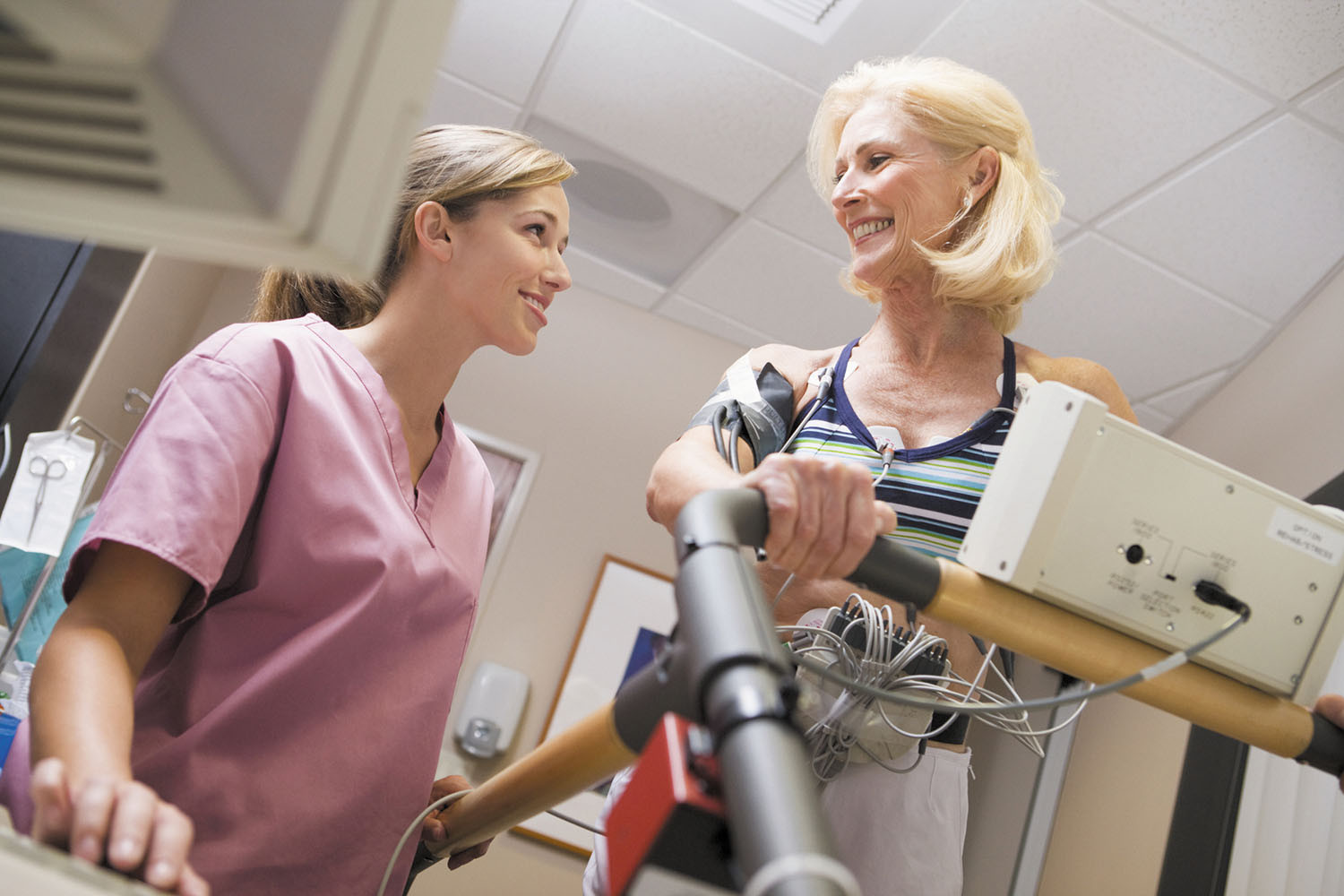Preparing for success in the operating room — and beyond
Prehabilitation can smooth and maximize your surgical recovery.
- Reviewed by Toni Golen, MD, Editor in Chief, Harvard Women's Health Watch; Editorial Advisory Board Member, Harvard Health Publishing; Contributor

The worry begins as soon as we schedule an elective surgery — whether joint replacement, hysterectomy, hernia repair, or any of the scores of procedures that account for the 15 million operations Americans undergo each year. Spun differently, though, the waiting time represents an opportunity: not to fret, but to prime your body for the rigors of surgery to maximize recovery afterward.
There's a name for such efforts: prehabilitation, or prehab. Sometimes part of a formalized program — but often not — prehab involves a wide range of measures around the time of surgery to point you toward success. Research suggests prehab can increase the odds you'll heal faster, experience fewer complications, and recover more smoothly over all, especially if you're at higher risk because of age, illness, or frailty.
"Surgery is really a controlled trauma, particularly for people with lots of other chronic diseases," says Dr. Zara Cooper, director of the Center for Geriatric Surgery at Harvard-affiliated Brigham and Women's Hospital. "So we want to make sure you're in the best possible shape to endure a trauma."
Reaching toward a goal
Prehab is an especially valuable option for adults 70 and older, since one in three doesn't return to the same level of functioning within six months after major surgery, according to a 2021 study in the Journal of Hospital Medicine. Most likely to recover, the study suggests, are older adults who undergo elective surgeries for which they can prepare in advance — the very essence of prehab.
"When we have time to prepare, we have opportunities to make measurable differences in how people do after surgery," Dr. Cooper says.
Though prehab has existed in some form for more than 75 years, many people are still unaware of it, Harvard experts say. But it's an idea whose time has come. Dr. Rachelle Bernacki, director of care transformation and postoperative services at the Center for Geriatric Surgery at Brigham and Women's Hospital, introduces the concept to patients who've scheduled surgery by asking them their goal.
"Prehab is going to help you reach that goal faster," she says. "Going into surgery is the ultimate loss of control, but prehab can funnel your anxiety about surgery into a positive thing."
Tailored approach
Prehab involves a personalized mix of these components, which are tailored to your specific surgery and health risks:
1. Nutritional support. Surgery is even tougher on the body if you've lost weight for no reason, lost muscle mass, or have trouble eating. The same is true if you carry too many extra pounds. If you are underweight or overweight, lab tests can pinpoint deficiencies in key nutrients that provide the building blocks of healing (see "Foods that help you heal after surgery"). You may also need to gain or lose weight or take supplements to boost nutritional reserves.
2. Strength and fitness. Simple strength tests can point toward exercises that target weak muscles and improve balance. Before surgery, your doctor may recommend a regimen of aerobic exercise, such as brisk walking, or resistance exercises to strengthen muscles. Chair exercises or tai chi can also be helpful.
3. Blood sugar control. Keeping blood sugar control is vital for everyone about to undergo surgery. That's because unsteady blood sugar levels increase the risk of infections and other complications afterward. Your doctor can lay out a plan to stabilize your blood sugar levels or even delay surgery if you have diabetes and sugar levels aren't controlled.
4. Medication management. Tell your doctor well before surgery what prescription and over-the-counter drugs and supplements you're taking. Some can increase your bleeding risks, and others can potentially slow healing. You may be asked by your doctor to temporarily stop taking certain drugs, such as blood thinners or medications associated with confusion, delirium, and falls, such as certain anti-anxiety drugs and sleep aids, Dr. Bernacki says.
5. Smoking cessation. Smoking is never good for your health, but that's especially the case if you're headed into surgery. It can hinder breathing and raise risks of postoperative infection or heart attack. "Stopping smoking is one of the most difficult and most effective things you can do for your recovery," Dr. Bernacki says.
6. Pain management. Some types of surgery bring more pain than others. Ask your doctor about pain relief options after surgery and, if possible, strategies to minimize the need for opioids, which pose the risk of addiction.
7. Delirium prevention. More than seven million hospitalized Americans each year experience delirium, a sudden and scary state of confusion that can linger for days. This cognitive complication doesn't just strike older adults. Even simple preoperative measures such as getting adequate sleep can lower the odds. And if your drinking habits include more than one alcoholic beverage each day, Dr. Bernacki recommends cutting back well before surgery, since delirium is also linked to alcohol withdrawal.
Foods that help you heal after surgeryIf you were training for a marathon, part of the preparation would involve powering up your nutrition to maximize performance. Surgery taxes your body in a similarly grueling fashion, and what you eat can have significant consequences on how well you recover, says Nancy Oliveira, a registered dietitian and manager of the Nutrition and Wellness Service at Brigham and Women's Hospital. Many foods have been shown to tamp down inflammation, improve immune function, and promote healing. "What you put in your body during this period definitely makes a difference," Oliveira says. "Certain nutrients, vitamins, and minerals are associated with healing cells, skin, and wounds internally. So having a store of nutrients ready to tap into places you at an advantage." Oliveira suggests zeroing in on these nutrients: Protein. It builds muscle and helps maintain strong bones, as well as supports the production of key enzymes and hormones. Protein also helps you stay fuller longer. Stick with lean proteins such as poultry and fish along with beans, eggs, tofu, or tempeh. "Your cells are going to be in repair mode, so protein is important before and after surgery," Oliveira says. Fruits and vegetables. These colorful options are rich in vitamins, minerals, and fiber. Low-sodium frozen and canned versions make them easy to stockpile in advance, to eat while you're on the mend. Whole grains. Fiber-filled beans, whole-wheat breads and pastas, brown rice, barley, quinoa, and oats can stave off constipation, which can be a side effect of surgery. As your operation approaches, it's wise to cut out fatty and highly processed foods, which fuel inflammation and hinder healing, Oliveira says. After surgery, wade back into normal eating habits with easy-to-stomach but nutritious options such as scrambled eggs, Greek yogurt, fruit smoothies, and broth-based soups. Other anti-inflammatory components include green tea, turmeric, salmon, and green leafy vegetables. "If you have relatives or friends who want to cook for you after surgery, ask for soups," she says. "They're so easy to make, and so much better for you than a heavy casserole with cheese and tons of pasta." |
Wide-ranging benefits
Formalized prehab programs are more common in certain medical specialties. Because of that, research on prehab's benefits also tends to concentrate on its use surrounding specific procedures.
People undergoing major abdominal surgery, for instance, experience significantly fewer lung complications, and fewer overall complications, by engaging in a prehab regimen that includes exercise, according to a 2020 study in the Journal of Gastrointestinal Surgery. But data suggest that many forms of prehab offer advantages such as shorter hospital stays, lower readmission rates, fewer complications, and less postoperative pain, according to a 2017 study in the journal BJA Education. "These are all outcomes patients would want," Dr. Cooper says.
Formalized prehab programs are still spotty, as is health insurance coverage. So it's often up to you to ask your surgeon or team if you might benefit from a structured approach to prepare for surgery. That includes asking about targeted programs for smoking cessation or fitness. "You need to be proactive," Dr. Bernacki says.
Harvard experts also recommend asking these questions:
- What else can I do before surgery to ensure the best results?
- Would I be better off preparing longer before surgery, or having surgery sooner?
- How can my family help maximize my recovery?
"The more patients know about prehab, the more likely they are to get it," Dr. Cooper says. "More and more old-er adults are undergoing surgery, so prehab should only continue to become a more important part of the process."
Image: © Monkey Business Images/Getty Images
About the Author

Maureen Salamon, Executive Editor, Harvard Women's Health Watch
About the Reviewer

Toni Golen, MD, Editor in Chief, Harvard Women's Health Watch; Editorial Advisory Board Member, Harvard Health Publishing; Contributor
Disclaimer:
As a service to our readers, Harvard Health Publishing provides access to our library of archived content. Please note the date of last review or update on all articles.
No content on this site, regardless of date, should ever be used as a substitute for direct medical advice from your doctor or other qualified clinician.
















